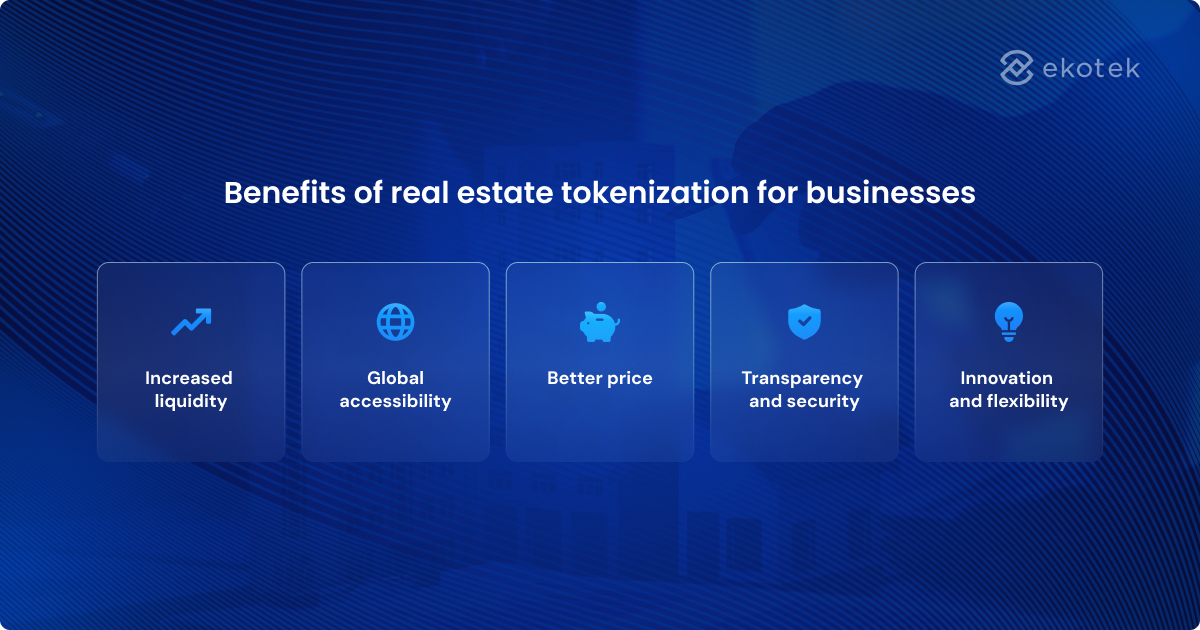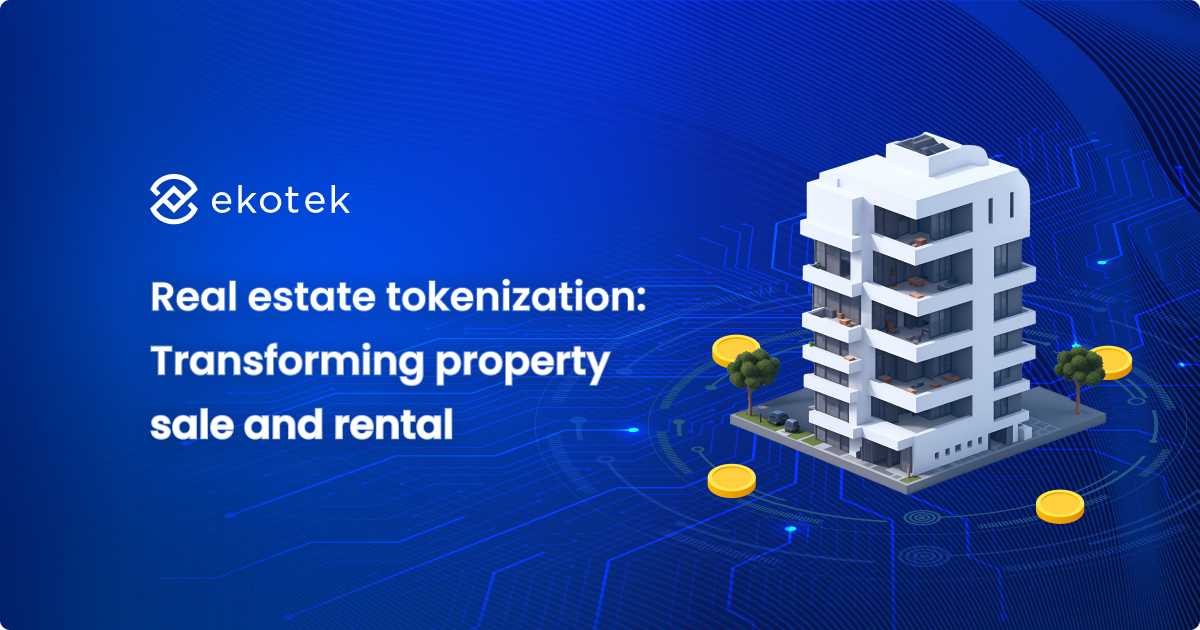
- 1
- 2
- 3
- 4
- 5
- 6
- 7
According to AWS, The global real estate market is booming, valued at USD 9.8 trillion in 2023 and projected to reach $14.5 trillion by 2030. However, it faces critical challenges of liquidity and accessibility, making it hard to sell quickly.
By leveraging blockchain technology, tokenization enables real estate assets to be divided into smaller, tradable digital tokens, introducing enhanced accessibility, liquidity, and transparency to the traditionally illiquid real estate market. Our blog will guide you through the intricacies of real estate tokenization, covering the types of tokens available and providing a step-by-step guide to getting started.
What is real estate tokenization?
Real estate tokenization is the process of converting real estate assets into digital tokens (NFT) on a blockchain, allowing businesses or landholders to fractionalize their properties for sale without impacting the price. These assets can be securely traded and transferred through smart contracts, ensuring transparency and reducing intermediaries.
Which methods can be used to tokenize real estate?
To better understand the intricacies of real estate tokenization, let’s explore several key methods that illustrate how this innovative approach can be applied in practice. Each method offers unique advantages and opportunities for businesses, allowing them to engage with the real estate market in diverse ways.
Simple tokenized real estate
Simple tokenized real estate refers to the process of representing a single real estate property as a digital token on a blockchain, often in the form of a non-fungible token (NFT). This approach offers several key benefits for businesses:
- Unique ownership representation: Each token is unique and verifiably different from others by using NFT, making it an ideal fit for real estate, where each property has distinct characteristics.
- Streamlined transactions: The NFT facilitates a straightforward transfer process, allowing ownership changes to occur in minutes instead of weeks.
- Critical data storage: The NFT securely stores essential property information (e.g., address, sales history) and ensures the data remains immutable, providing transparency and easy access for buyers.
Dynamic tokenized real estate
This involves properties that can change in value or purpose over time, facilitated by the use of dynamic NFTs. For example, a residential property might be converted into a commercial space or undergo renovations that increase its value. These changes can be reflected in the token’s value on the blockchain, allowing the information to be updated flexibly and in real-time. Some key features:
- Automatic data updates: The NFT can automatically update critical information on the smart contract, such as details about renovations, improvements, or fluctuations in market value. This enhances the exchange of relevant information between parties.
- Enhanced insight: As properties change hands, the dynamic NFT can store images, videos, and historical data that showcase the property’s condition over time.
Fractionalized real estate
Fractionalized real estate takes the concept of tokenization further by enabling multiple businesses to hold shares in a single property through tokens. This model lowers the barrier to entry, allowing small companies to participate in lucrative markets that were once reserved for wealthy individuals. By owning a fraction of properties, they can mitigate risks associated with individual assets. Fractionalized real estate democratizes access to property investments, fostering a more inclusive investment environment. Some key features include:
- Shared ownership: Multiple businesses can invest in a single property, allowing for diversified investments without the need for large capital outlays.
- Increased liquidity: Tokenized shares can be traded on secondary markets, providing greater liquidity and flexibility compared to traditional real estate investments.
Tokenized real estate cash flows
Tokenized real estate cash flows represent the income generated from rental properties, which can be distributed to token holders. Businesses receive dividends or distributions based on the number of tokens they own, providing a consistent stream of income. For example, a commercial property generates $100,000 in annual rental income, which is tokenized into shares. If one holder owns 10% of the tokens, they receive $10,000 each year, benefiting from both the steady cash flow and any potential appreciation in the property’s value. This feature enhances the attractiveness of real estate investments as they can benefit from regular cash inflows while also having the potential for capital appreciation. This method’s key features are:
- Separation of ownership and cash flow right: Provide flexibility in investment strategies.
- Representation as NFTs: The rights to cash flows can be represented as non-fungible tokens (NFTs), making them easily tradable and verifiable.
- Automatic distribution: Cash flows can be automatically redirected to the NFT owner, ensuring timely and reliable income distribution.
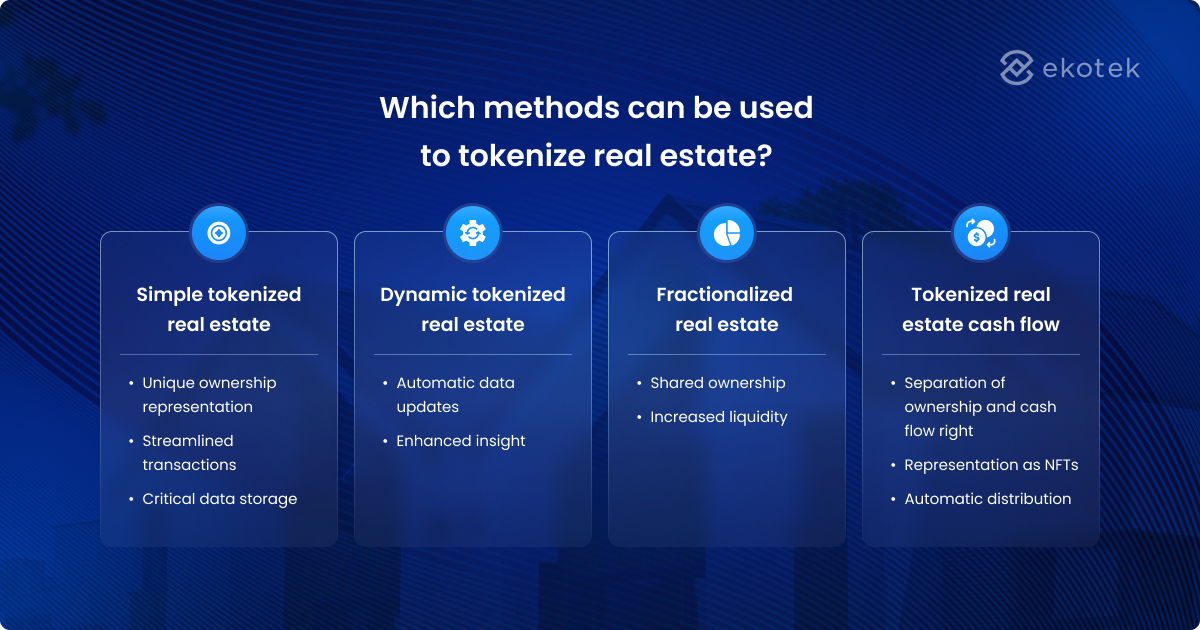
Benefits of real estate tokenization for businesses
Increased liquidity
One of the biggest challenges in real estate investment is the lack of liquidity. Traditional real estate assets can take months or even years to sell, tying up significant capital. Tokenization addresses this by enabling fractional ownership, which makes it easier to sell shares of a property. This opens the door for faster transactions, enabling more flexible asset management.
Global accessibility
The tokenization of real estate enables businesses to overcome geographic barriers that have historically restricted investment opportunities. By leveraging blockchain technology, companies can reach global buyers, making their properties accessible to anyone with internet access and the necessary funds. This expanded reach allows businesses to tap into international markets, attract diverse investors, and optimize asset utilization, creating a more dynamic and globalized investment landscape.
Better price
Tokenization enables businesses to create platforms for fractional ownership, allowing them to offer real estate assets in smaller, more affordable shares. This approach reduces the capital required to engage with high-value properties, enabling companies to attract a broader range of investors without the financial burden of full ownership. By facilitating access to fractionalized assets, businesses can enhance liquidity and optimize their asset management strategies. This flexibility allows companies to leverage market opportunities more effectively, creating a competitive advantage in the real estate market.
Transparency and security
Blockchain technology ensures that all transactions are recorded on an immutable ledger, meaning they cannot be altered or tampered with. This level of transparency builds trust among businesses and provides a clear, accessible history of ownership and transactions. Additionally, the use of smart contracts automates many processes, reducing the chances of human error or fraud.
🔎 Read more about how to use blockchain for cross-border money transfer
Innovation and flexibility
These self-executing smart contracts automate various aspects of real estate management, such as revenue distribution, property management tasks, and compliance checks. This innovation can lead to more efficient operations and lower management costs. Besides, tokenization allows for the creation of innovative investment structures, such as income-generating tokens or dynamically valued tokens based on market conditions.
Popular types of property that can be tokenized
Real estate tokenization can be applied to various types of properties, each offering unique investment opportunities. Here are 4 major property types that can be tokenized:
Residential properties
Residential properties, including single-family homes, apartments, and condominiums, are among the most commonly tokenized assets. Businesses can tokenize these properties to offer fractional ownership, enabling them to attract a wider range of stakeholders. This approach not only enhances liquidity but also allows companies to access residential markets in various locations.
Commercial properties
Commercial real estate, such as office buildings, shopping centres, and warehouses, represents a lucrative sector for tokenization. By tokenizing these assets, businesses can generate substantial rental income while making it easier for smaller firms to participate in high-value markets. This method allows companies to leverage their assets more effectively, providing a pathway to broaden their investment base without requiring significant upfront capital.
Hospitality properties
Hotels, resorts, and other hospitality-related properties can also be tokenized, allowing businesses to share ownership of high-end facilities. Through tokenization, companies can benefit from revenue generated by room bookings and services, attracting interest from partners in the tourism and leisure sectors. This type of investment can enhance operational capacity and improve financial flexibility while capitalizing on location, brand strength, and occupancy rates.
Ekotek has successfully built a platform that enables the tokenization of resorts, providing innovative solutions for the hospitality industry. To learn more about this success story, contact Ekotek.
Mixed-use developments
Mixed-use developments combine residential, commercial, and sometimes industrial spaces into a single property. These developments serve as community hubs, offering diverse amenities and services. Tokenizing mixed-use properties enables businesses to tap into multiple income streams, from residential rents to commercial leases, within a single asset. This diversification not only enhances resilience but also attracts a broader audience, fostering community engagement and stability.
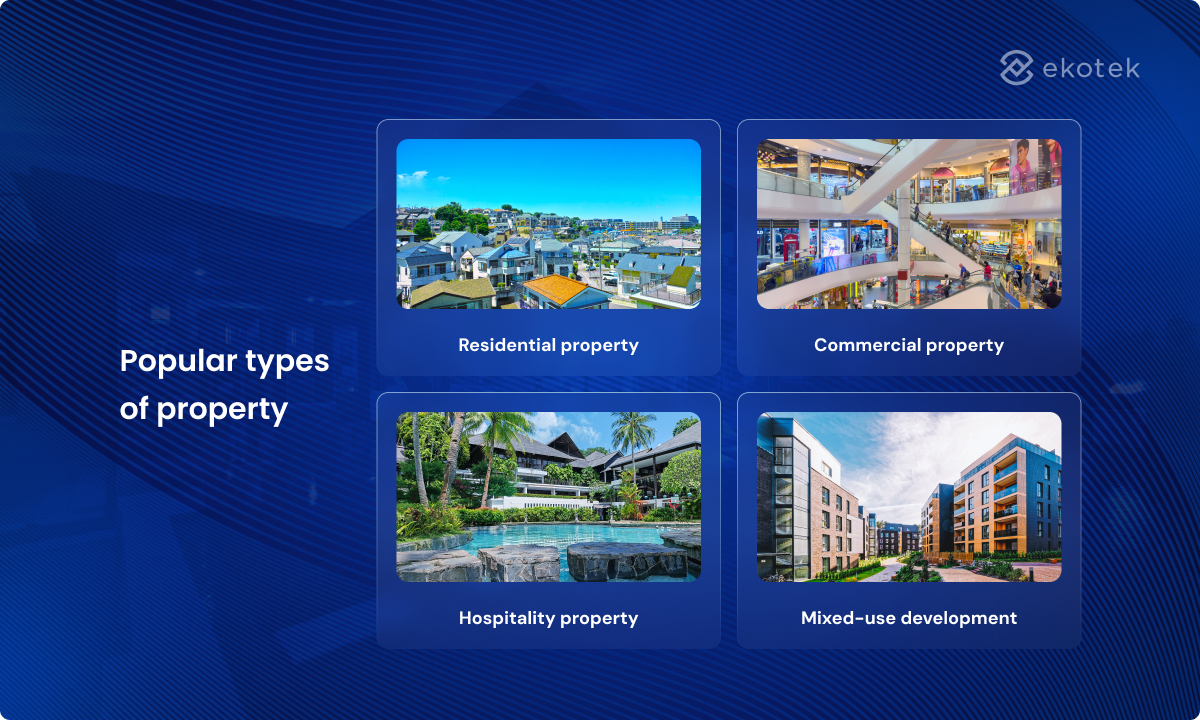
Successful real estate tokenization projects
Aspen Coin
Aspen Coin allows investors to buy shares of the St. Regis Aspen Resort in Colorado, making it one of the first luxury resorts to tokenize its equity. As a pioneering project in the tokenization of luxury hospitality, Aspen Coin has set a precedent for future ventures in this space, attracting significant interest from investors looking for opportunities in high-value assets. The tokenization successfully raised $18 million for 18.9% of the resort hotel’s shares.
Key features:
- Target audience: Accredited investors, offering them the opportunity to own a stake in a high-end hospitality asset.
- Blockchain integration: Aspen Coin enables shares to be traded on a secure platform, enhancing liquidity and transparency.
- Revenue model: Investors benefit from the hotel’s revenue through dividends distributed based on their ownership stake, showcasing a unique model of revenue sharing in the luxury real estate sector.
RealT
RealT is a tokenized real estate platform focused on U.S. residential rental properties, allowing investors to purchase tokens that represent ownership in various rental assets. Since launching, it built a loyal and ever-growing community of over 7,500 active investors in 125 different countries, and more than 18,000 registered users. With blockchain technology, RealT provides a transparent and efficient way for investors to participate in the rental property market, making it a significant player in the tokenization of residential real estate.
Key features:
- Fractional ownership: Enable individuals to invest with smaller amounts of capital, democratizing access to real estate investments.
- Steady income stream: Investors receive earnings from rental income, which are distributed as dividends to token holders, creating a steady income stream.
- Enhanced liquidity: RealT simplifies the investment process and allows tokens to be traded on secondary markets, increasing liquidity for investors.
Propy
Propy is a real estate transaction platform that focuses on tokenizing both residential and commercial properties, offering a seamless, blockchain-based method for buying and selling real estate. One of its landmark achievements was the tokenized sale of a $1.6 million apartment in Kyiv, Ukraine, which became one of the first properties sold using blockchain technology. The success of Propy highlights the potential of blockchain to revolutionize real estate, providing a more efficient and accessible way for investors to engage in the market.
Key features:
- Smart contract: Propy’s platform not only facilitates global real estate transactions but also enhances security, transparency, and speed through its use of smart contracts.
- Streamlined process: Propy addresses many traditional challenges in real estate transactions, such as lengthy paperwork and high fees.
- Global transactions: The platform facilitates real estate transactions on a global scale, connecting buyers and sellers from various countries.
🔎 You might be interested in Top 9 successful RWA projects in 2024
Get started with real estate tokenization
Tips for businesses interested in tokenized real estate
For businesses looking to enter the world of tokenized real estate, there are several important considerations:
- Research thoroughly: As with any investment, it’s crucial for businesses to perform thorough due diligence. Evaluate the property’s location, potential rental income, and the expertise of the management team to ensure a robust investment strategy.
- Understand the legal landscape: Tokenized real estate operates within specific legal frameworks, and these can vary depending on the region. Businesses must familiarize themselves with the regulations in the jurisdiction where the property is located to ensure compliance and mitigate risks.
- Diversify: Tokenization facilitates diversification by allowing businesses to engage in fractional ownership across multiple properties. This strategy can help mitigate risks and optimize the overall portfolio.
- Monitor market trends: The real estate and blockchain landscapes can be volatile. Staying informed about market trends and technological advancements will enable businesses to make strategic decisions and adapt to changing conditions effectively.
Start your business of real estate tokenization
- Identifying the asset: The process begins by selecting a physical real estate asset, such as a residential property, commercial building, or land. This asset is evaluated for its market value and investment potential.
- Legal structure and compliance: Before tokenization, the legal framework for the asset must be established. This includes ensuring compliance with local regulations, zoning laws, and securities laws. Legal experts often create a structure that allows the asset to be fractionalized into tokens.
- Asset valuation: A thorough appraisal is conducted to determine the fair market value of the property. This valuation is crucial as it influences the total number of tokens created and their worth.
- Real estate marketplace development: To build a tokenized real estate platform, you need a skilled technical team experienced in Web3. If your in-house team lacks the necessary resources, consider partnering with a vendor that has extensive know-how in Web3 and a successful track record in developing RWA projects. For further assistance in developing your real estate tokenization platform, reach out to Ekotek, our Web3 experts are ready to help you bring your vision to life.
- Token distribution: The tokens are then distributed to investors, who can purchase them through a token sale or offering. Investors buy these tokens, thereby acquiring fractional ownership of the property without needing to buy the entire asset.
- Trading and liquidity: Establish partnerships with exchanges or platforms that support the trading of real estate tokens. This will enhance liquidity and provide target audiences with options to buy and sell their tokens easily.
- Ongoing management: Continuously manage the properties and monitor performance. Provide regular updates to token holders about property status, income generation, and any relevant market changes.
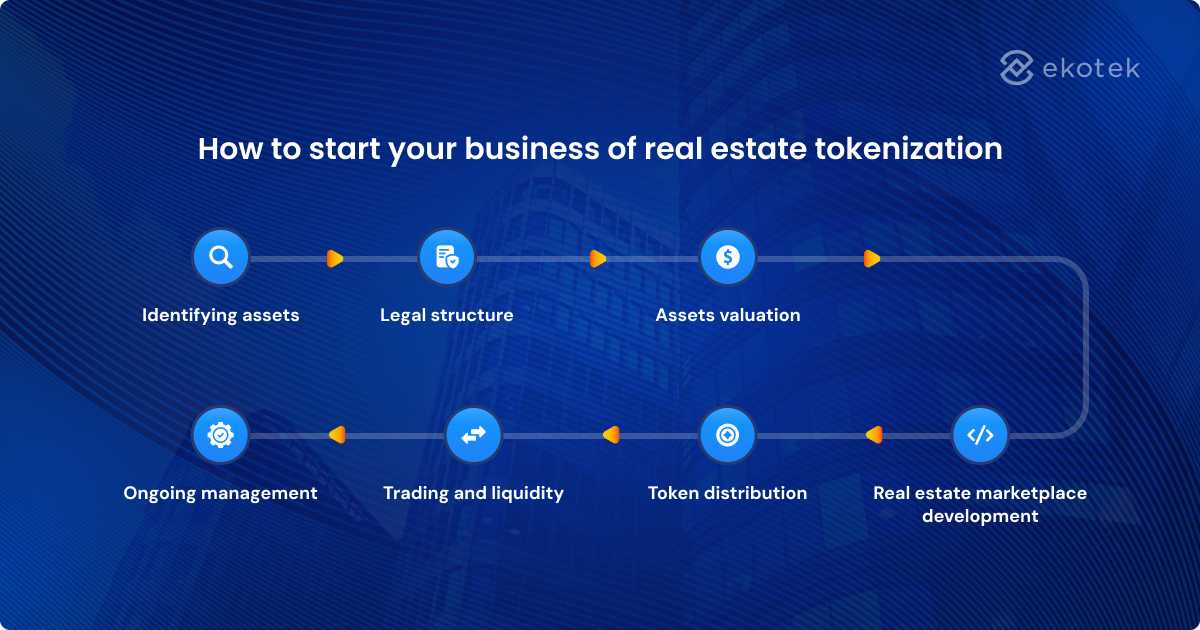
Final thought
As this innovative technology continues to grow, the opportunities for tokenized real estate investment are expanding. By understanding the types of tokens available, the benefits of tokenization, and the platforms supporting it, businesses can make informed decisions and capitalize on the future of real estate investing.
Ekotek is a Clutch-verified company in blockchain and software development, with exceptional expertise in asset tokenization. Whether you aim to tokenize real estate or other valuable assets, we provide world-class services with robust security protocols, scalable infrastructure, comprehensive analytics, and a seamless asset trading experience. We also offer ready-made solutions for faster time-to-market while tailoring them to meet your specific needs. Our proven track record in tokenization services makes us the ideal partner for any tokenization project. Contact Ekotek to get started today!
- 1
- 2
- 3
- 4
- 5
- 6
- 7
